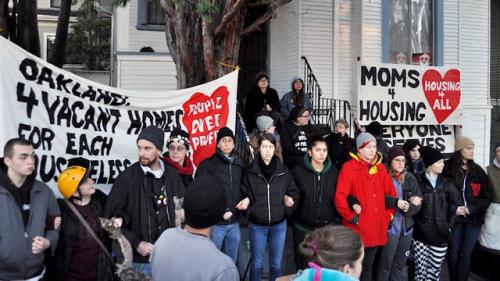Moms 4 Housing in Oakland Continue MLK’s Fight
- Opinión

Early Tuesday morning, a day before the anniversary of Martin Luther King Jr.’s birth, a small army of police, sheriff’s deputies and a tactical SWAT team with a military robot laid siege to a house in Oakland, California. The threat they were confronting? Women and children nonviolently struggling for safe and affordable housing. They had occupied the vacant home at 2928 Magnolia St. in west Oakland since Nov. 18. Moms 4 Housing “is a collective of homeless and marginally housed mothers,” their website states. “Before we found each other, we felt alone in this struggle. But there are thousands of others like us here in Oakland and all across the Bay Area. We are coming together with the ultimate goal of reclaiming housing for the community from speculators and profiteers.” Two mothers and two supporters were arrested during the pre-dawn raid, and the house, owned by real estate speculation corporation Wedgewood Properties, was quickly boarded up.
Dominique Walker is one of the Moms 4 Housing, but wasn’t arrested; at 5 a.m. that morning, she was in a TV studio, appearing live on the Democracy Now! news hour. The police raid had not yet begun. “We’ve provided shelter for our children,” she said on the program. “This came out of absolute desperation, out of going through every program set up to help families in this predicament. Nothing helped. We were turned away. The funding was cut from programs that were set up to help … it just gives light to the bigger issue.”
Carroll Fife, who runs the Oakland office of the Alliance of Californians for Community Empowerment, sat next to Walker on the broadcast. “After the housing crisis and the foreclosure crisis of 2008, many homeowners lost their primary residences — their only residences,” Fife explained. “That allowed speculators and the banks that were bailed out by the government at that time to come in and scoop up homes at rock-bottom prices … We’re still experiencing the impacts of the foreclosure crisis, with speculators owning 35% of the housing stock in America.”
Had Martin Luther King Jr. not been assassinated in 1968 at the age of 39, he would have turned 91 on Jan. 15. His civil-rights work in the South is well-known. Speaking at the end of the Selma to Montgomery march for voting rights in 1965, he said, “We are on the move and no wave of racism can stop us. … The burning of our churches will not deter us. The bombing of our homes will not dissuade us. We are on the move now. The beating and killing of our clergymen and young people will not divert us … Let us march on segregated housing until every ghetto or social and economic depression dissolves, and Negroes and whites live side by side in decent, safe and sanitary housing.”
In the following months, King set his sights on confronting racism in the North. He launched the Chicago Freedom Movement, attacking racism and housing segregation in that city and its suburbs. He was violently attacked there, and told reporters, after being struck in the head with a rock: “I have never seen, even in Mississippi and Alabama, mobs as hateful as I’ve seen here in Chicago. Yes, it’s definitely a closed society. We’re going to make it an open society.”
That campaign successfully challenged systemic racism, redlining and other forms of housing discrimination in Chicago, and helped spur the passage of the Fair Housing Act in 1968. Violations of that law forced developer Fred Trump and his son Donald Trump to settle with the federal government in 1975 over allegations that the Trumps systematically discriminated against African-American apartment seekers in their Queens, New York, housing complexes.
Back in Oakland on Tuesday, as Democracy Now! was wrapping up at 6 a.m. Pacific time, Carroll Fife concluded: “We need to take speculation out of real estate, and we need to decommodify housing … we look forward to the fight.” They received a text message that the raid was underway, and rushed off to join the other mothers and their supporters on Magnolia Street. Police used a battering ram to break down the door of the house, terrifying the mothers inside before hauling them out.
Later that day, halfway across the country, six white candidates for the Democratic presidential nomination gathered in Iowa, one of the whitest states in the nation, for the final televised debate before the Iowa caucuses. Outside, Rev. William Barber was leading a “Moral March on the Debate.” Barber and his Poor People’s Campaign are demanding that the candidates participate in a nationally televised debate on poverty, including the crisis of homelessness. The movement continues Martin Luther King’s final campaign, the Poor People’s Movement, which he was launching when he was assassinated. More than 50 years later, from Chicago to Oakland to Des Moines, the fight continues.
January 17 2020
The original content of this program is licensed under a Creative Commons Attribution-Noncommercial-No Derivative Works 3.0 United States License. Please attribute legal copies of this work to democracynow.org.
Del mismo autor
- Putin’s war on Ukraine could spark a nuclear catastrophe 04/03/2022
- La persecución de Biden contra Julian Assange 18/01/2022
- Biden’s persecution of Julian Assange 06/01/2022
- ¿Reconstruir mejor o construir más bombas? La elección es clara 13/12/2021
- Facebook Papers: cumplicidade no ódio, nas mentiras e na violência 28/10/2021
- Es hora de eliminar a Facebook de nuestra lista de amigos 11/10/2021
- El espía que se metió en tu teléfono 20/09/2021
- De Kabul al río Bravo, Estados Unidos crea crisis de refugiados 31/08/2021
- Después de décadas de guerra, el pueblo afgano merece la paz 23/08/2021
- Código rojo: la emergencia climática exige una acción inmediata 16/08/2021








